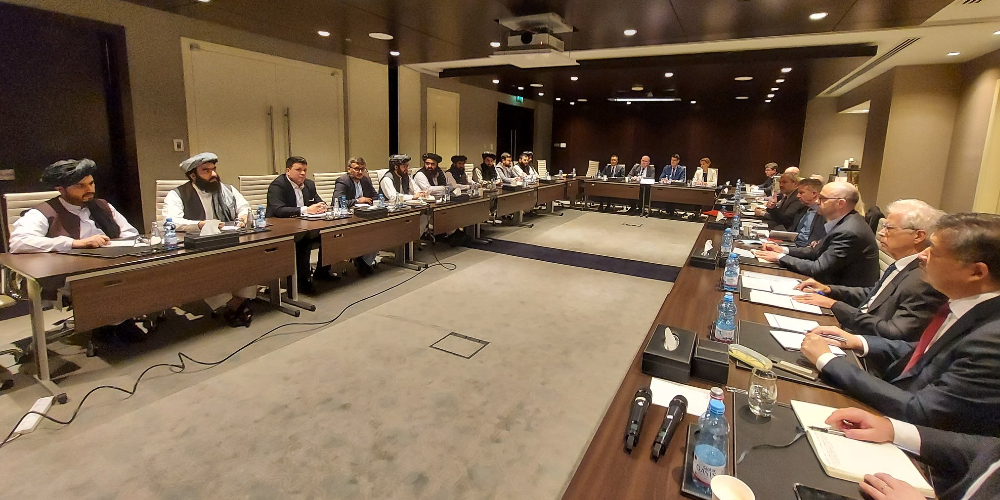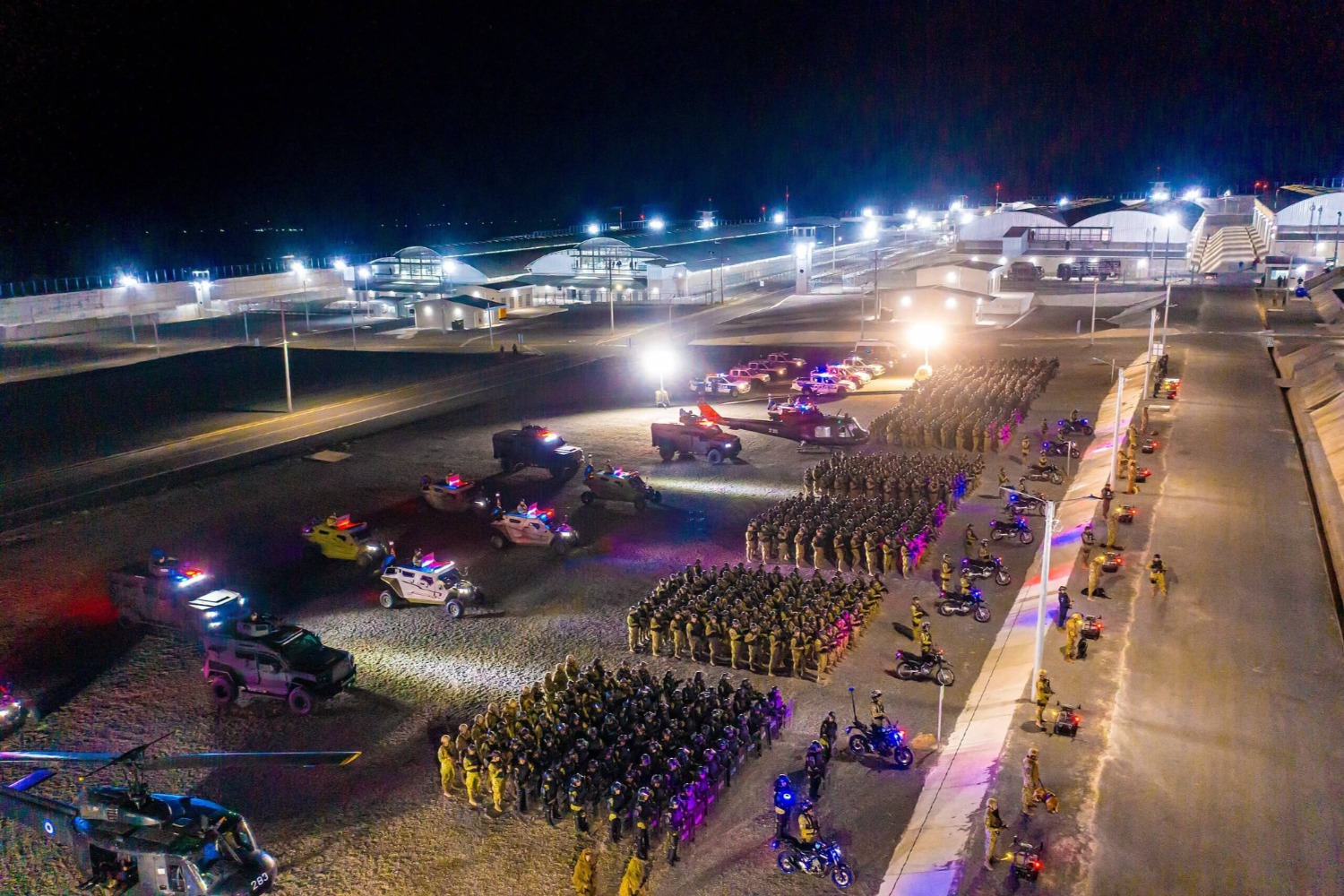Why International Leverage Has Failed With the Taliban

Published by The Lawfare Institute
in Cooperation With

Editor’s Note: For the United States and its allies, Afghanistan is the problem that will not go away. The country is facing a major humanitarian crisis, and the Taliban have refused to bend to pressure from the United States and its partners on human rights issues. Romain Malejacq and Niels Terpstra of Radboud University describe the failure of this policy so far, arguing that promises of aid and recognition do little to sway the Taliban, given its stress on internal cohesion.
Daniel Byman
***
Since the Taliban takeover in August 2021, the international community’s dominant mode of engagement with the new rulers of Afghanistan has been one of pressure and leverage. This approach has rested on the widely held assumption, among experts and diplomats alike, that the Taliban regime could not survive without engaging with the international community. In the short term, the de facto authorities would surely prove incapable of confronting the country’s unprecedented economic, financial, and humanitarian crises without foreign aid, the lifting of sanctions, and the unfreezing of financial assets. In the long term, they would be compelled to pursue the international recognition that they had failed to obtain during their first stint in power from 1996 to 2001.
So far, though, demands from diplomats regarding human rights, inclusivity, and counterterrorism cooperation have been systematically rebuffed by the so-called Islamic Emirate of Afghanistan (IEA) in the two years it has been in power. In fact, Taliban policies have turned even more draconian over time, in particular concerning women’s rights. Since November 2022, a series of decrees has barred women from parks, gyms, and public baths, banned them from attending university and education centers, and forbidden them from working for either nongovernmental organizations or the United Nations. Interviews we conducted with foreign diplomats and IEA officials in Doha and Kabul show that the current leverage approach is both inefficient and counterproductive. Increased public pressure and the stepping up of sanctions will not make the Taliban regime more responsive and will not help the most vulnerable members of the Afghan population. Rather, continued and effective diplomatic engagement is crucial to socialize the de facto authorities to international standards.
Foreign Aid and Reverse Leverage
The idea that foreign aid could be used to moderate the Taliban has been largely echoed by international media and outside observers since the very first days of the new regime. Some even specifically claimed that Western powers had the “upper hand” because the Taliban were in a “position of weakness.” Such analyses were based on a gross misunderstanding of both the functioning of aid conditionalities and the internal dynamics of the Taliban organization. And yet, the idea that the Taliban’s need for foreign aid would make them responsive to international demands has dominated engagement with the IEA on the part of the United States and “like-minded countries” (including Canada, Australia, Japan, the United Kingdom, Norway, and the European Union’s five largest contributors), which share similar values, principles, and interests when it comes to Afghanistan.
This approach was evident less than two weeks after the Kabul takeover, when Secretary of State Antony Blinken spoke of “points of incentive and points of leverage” with the Taliban regime regarding the evacuation of Afghan citizens wanting to leave the country. A few days later, President Biden mentioned leverage again and argued that human rights would be “the center of [U.S.] foreign policy” in Afghanistan, to be conducted “through diplomacy, economic tools, and rallying the rest of the world for support.” And, on Sept. 15, 2021, the European Union established five benchmarks to “serve as guiding principles for future engagement.” This emphasis on conditionality has continued now for the past two years, and the introduction of the “Taliban Sanctions Act” in May of this year is only the latest attempt to step up the leverage logic.
Contrary to most expectations, the IEA has survived and maintained some state capacity despite the drastic reduction in foreign aid. The regime has been able to create revenue through taxation, somewhat dampening the initial economic shock of the sanctions regime, while developing what on paper looks like a fiscally responsible quarterly budget. Despite a chaotic transition, basic government functions appear to be operating and civil servants are mostly getting paid—though initially with aid from UN agencies and the Global Fund. Though little is known about what the de facto authorities spend money on (apart from the security sector), service provision seems low on their priority list. Some observers even argue that “[the Taliban] would rather see the Afghan population starve to death than undermine [their puritanical] mission.”
To compensate for this without directly funding (and hence bolstering) the Taliban regime, donors, including the United States, have continued to provide substantial off-budget humanitarian assistance and basic service delivery channeled through the United Nations and nongovernmental organizations. Generally, the Taliban neither expect nor desire high levels of foreign aid, which, they understand, would make them dependent on outsiders and more exposed to both corruption and external pressure. The new rulers of Afghanistan seem engaged in a game of chicken with the international community. As one diplomat we talked to put it: “They do not seem to care about the population that much, so the leverage there seems somewhat limited.” If the international community is more willing to provide humanitarian aid and basic services than the regime is to make concessions, the leverage, in this relationship, is in fact reversed.
This is not to say that money doesn’t matter or that external funding hasn’t been drying up. Afghanistan is going through the largest humanitarian crisis in the world by most standards, with an estimated 28 million people depending on aid to survive in 2023. But the Taliban have plenty of sources of funding, outside the like-minded countries, that they can tap into and options for economic cooperation throughout the region. Not only do countries like China, Russia, Iran, and Pakistan not necessarily share the same values and principles as this group of countries, but they also have strong interests in engaging with and supporting the regime. For instance, Chinese authorities, who intend to include Afghanistan in their Belt and Road Initiative, have long been eyeing the country’s mineral resources, and Turkmenistan, which has recently started to export natural gas to Pakistan through Afghanistan, expects considerable revenues from gas delivery to Pakistan and India if the Turkmenistan-Afghanistan-Pakistan-India pipeline is ever completed. In view of increasing cross-border militant activity and the Taliban’s long history with Islamist jihadist groups in the region, neighboring countries would benefit from a stable Afghanistan with which they could cooperate on counterterrorism.
Two years into its rule, the Taliban regime appears sufficiently self-sustaining and adaptable to run a low-capacity state and withstand the pressure of aid conditionalities and sanctions. It may not be enough to properly feed the population, let alone thrive economically, but it might be enough for the regime to survive without being pushed into a corner.
The Fallacy of International Recognition
It should now be clear that foreign aid will not moderate the Taliban. Yet the idea that the international community can use the Taliban’s longing for international recognition as leverage continues to dominate analysis and policymaking. In the spring of 2022, a U.S. Institute of Peace report advocated making the “Taliban’s recognition contingent on their track record on responsible and inclusive governance.” After meeting with Taliban leaders earlier this year, UN Deputy Secretary-General Amina Mohammed concurred that international recognition was indeed a source of leverage that the international community “should hold on to.”
Many Taliban leaders do seem to care a great deal about international recognition. They want what they believe they are legally entitled to, from the billions of dollars in frozen central bank assets to international recognition. Importantly, they consider the sovereignty of the new regime as a right that the international community is denying them, rather than as an item on a list of demands that would be up for negotiation. Most, if not all, IEA officials seem to believe that they are not treated fairly, justly, and respectfully by the international community (or the media) in view of their 20-year struggle and the regime’s achievements of the past two years. It becomes clear when talking with members of the Taliban that recognition is not just a simple political matter but also an emotional one that will not be resolved through pressure and leverage alone.
This is even more true because international recognition is not on the table for any of the like-minded countries and won’t be anytime soon. In this context, dangling the carrot of international recognition is a dangerous game. Not only does it further damage the already-fragile relationship that most diplomats have with more “moderate” Taliban officials, but it is also likely to strengthen those who oppose broad international engagement in the first place. Some of the most conservative members of the Taliban might actually favor the adoption of a more isolationist foreign policy over engagement and international recognition. “Isolation is what they’ve always known and because of isolation they’re getting stronger, expanding intelligence services, they can tighten the system,” one Taliban observer explained. “Some are calling for isolation to become more permanent,” he said, because “isolation is how you build morality.” Not to mention that international recognition comes with legal responsibilities in terms of border control and counterterrorism cooperation that might not be welcomed by all.
The Diplomatic Deadlock
The discrepancy between what the international community wants and what the Taliban are willing to do has caught all parties in a frustrating and self-sustaining deadlock. Foreign governments operate on the basis that they hold what the de facto authorities want and need when, in reality, the Taliban have other priorities. IEA officials care much more about internal cohesion than they do about outside recognition, at least in the short term. Unity is what they believe led them to victory and is paramount to their remaining in power. As such, the need for group cohesion, once facilitated by the pursuit of a common objective, trumps the desire for international engagement.
In this context, ideologically driven and ideologically consistent policymaking serves as a virtue-signaling mechanism to legitimate the regime’s leadership to domestic audiences—from the rank and file to commanders to hardliners. Such policies signal the leaders’ own dedication to the cause, allowing them to lessen the risk of defection to other Islamist jihadist groups and to maintain internal cohesion around ideologically motivated individuals. This is especially relevant for the disgruntled members who either miss the “good old days of the jihad” or have grown disappointed in what they perceive as a soft Islamist regime. This incentivizes the Taliban leadership, and Emir Haibatullah Akhunzada chief among them, to cater to the movement’s most extreme members, regardless of personal preferences—which, in most instances, might align anyway.
In fact, the harder and the more publicly the international community makes demands, the more it plays into the extremists’ discourse. Taliban leaders won’t risk being perceived as yielding to foreigners, especially Westerners. This creates a situation in which IEA representatives in Kabul (generally more moderate and open to international engagement) make promises to foreign diplomats that later get reversed by the central leadership in Kandahar—as happened with the overturning of the decision to reopen girls’ secondary schools in the spring of 2022.
For the like-minded countries, changing course is also extremely challenging. The Biden administration, in particular, would rather ignore the situation than make politically contentious decisions that could draw negative media attention. Among diplomats and decision-makers of the like-minded countries, “the Taliban are a bad brand to be associated with.” One diplomat noted, “We have our constituencies at home, we have the taxpayers, the public in general,” and the Taliban “have their constituency as well.” The diplomats are caught in the middle. “They go back to their constituency, and we go back to our constituency,” he concluded. Without overlap between what each set of constituents is willing to accept or real leverage on either side, there is very little room for maneuver left for negotiations.
The Way Forward?
As former U.S. Ambassador to Afghanistan Ronald Neumann has said, “The current approach of sanctions, demands, and restricted contact with the Taliban is not working.” The policy of increased pressure that some have been advocating will not make the Taliban more responsive either and will certainly not help the most vulnerable members of the Afghan population. Worse, it could deepen the diplomatic deadlock and, by playing into the hands of the hardliners, further push the regime toward isolation and radicalization while complicating human rights monitoring.
The success of any alternative approach is not self-evident. Any potential policy will be a matter of navigating a variety of grim scenarios. Yet, should the like-minded countries pursue a “strategy of engagement that allows for the stabilization of Afghanistan but also allows for addressing important concerns,” as agreed during a recent meeting of special envoys on Afghanistan, they must start with determining a realistic end-state.
First, this entails acknowledging that the Taliban regime will be unlikely to develop forms of domestic accountability as long as their regime remains internally weak. This is not to say that the Taliban will become more accountable if they consolidate power, but accountability, change, and moderation are unlikely to occur as long as the core leadership sees regime survival as their only priority.
Second, to be successful, pressure for accountability will have to come from within Afghan society, rather than from the international community or the diaspora. Domestic forms of accountability will be better aligned with the norms and values of large segments of the Afghan population and are more likely to be accepted by the core Taliban leadership. Despite the recent authoritarianization of the regime, some local-level stakeholders—such as tribal leaders, village elders, and religious figures—have maintained influence. Compared to the 1990s, there is a greater diversity of critical voices speaking from within Afghanistan. These should be amplified, not co-opted.
Third and finally, behind-the-scenes diplomatic engagement remains crucial. The international community must maintain dialogue with a broad spectrum of regime officials (from the most “moderate” to the most conservative), at all levels of politics (from the local level to the top leadership). Private talks about humanitarian access, for instance, would enable the Taliban to make policy adjustments, however limited (including on less politically sensitive issues), with fewer constraints imposed by their hardline constituents. This implies neither normalization nor endorsement of the regime, but it allows for the long-term socialization of its members into international society. It also creates space for improved monitoring and understanding of the IEA that will be necessary for fostering incremental change.






